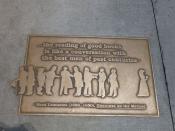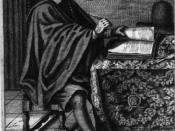Rene Descartes (1596 - 1650) was not only a philosopher but also a mathematician and scientist. As a philosopher he used the notion of scepticism as a means to find truth stripped of all ambiguity. In 'meditations one: what can be called into doubt' Descartes states that he shall "doubt everything that can possibly be doubted"1 in order to build a belief system which is indubitable. Descartes attempts to ascertain which of his opinions are false, not by individual inspection, but by saying that he shall "go straight for the basic principles on which all my former beliefs rested" 1. If he can cast doubt on the fundamental principles, any subsequent beliefs, which depend on the validity of them, will therefore be subject to doubt. Descartes then goes on to introduce the 'argument from dreams', which he uses to try and show that our senses can be doubted even under optimal conditions, thus casting doubt on any beliefs deduced through sensory experience.
Descartes attempts to show our senses' fallibility by firstly appealing to commonly known instances of perceptual illusion, such as objects being misrepresented from a distance, or a stick looking as though it is bent once put in water. Descartes comments "it is never prudent to trust completely those who have deceived us even just once" 1. This highlights an interesting point: it shows that, under certain circumstances, it is the case that we form opinions based on sensory experience that is false. Optical illusions, however, are the result of perception under conditions that are not ideal. Can we not trust those instances where conditions are ideal? For surely I may only know that my senses deceive me by contrasting such times with instances where they do not.
Descartes argues that we have reason to doubt all our sensory...


